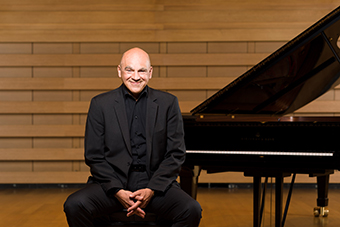
James Anagnoson
James Anagnoson (Jim), one of Canada’s most esteemed pianists and pedagogues, is originally from Boston, but relocated in 1976 to Toronto, where he collaborated with Canadian pianist Leslie Kinton to form the “Anagnoson & Kinton” piano duo. Jim joined the faculties of University of Toronto, University of Western Ontario, and the Glenn Gould School (associated with the Royal Conservatory of Music), and subsequently became Dean of the school in 2007. He received his initial musical training from the New England Conservatory, his Bachelor’s degree from the Eastman School of Music, and his Master’s degree from the Juilliard School, having studied with a list of distinguished pianists and teachers. However, Jim is best known not only for his musical, educational and administrative excellence, but also for his relaxed charm, his warm and personable disposition, his caring and compassionate temperament, and most memorable of all, his sense of humour and infectious laughter.
Our paths crossed in the 1980s, when we both were teaching young talents who regularly competed in major competitions in various cities across the country. We often found ourselves sitting next to each other in concert venues, anxiously engaged in our students’ performances, and earnestly sharing our insights. What impressed me most about Jim as a teacher, was the fact that he was demanding but patriarchal, instilling high standards but benevolent, serious but always fun to be with. I remember distinctly an incident when he seemed more concerned about the well being of his prodigy rather than the outcome of his performance, and least about the result of the competition. He had an abundance of comforting words for stressed-out students (parents and teachers alike), plus jovial anecdotes to lift everybody’s spirits. That is why after all these years, I decided to track him down for an interview so he can impart some of his wisdom.
Jim and the Glenn Gould School
Can you please relate to our readers a brief chronicle of the Glenn Gould School?
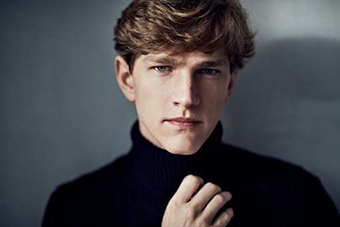
Jan Lisiecki, alumnus of The Glenn Gould School
© Christoph Köstlin | Deutsche Grammophon
The GGS parachuted into the Royal Conservatory in the early 1990s and hit the ground running. The mission of GGS was to become a Curtis for Canada – a very small performance school that offered students the finest teachers, extra one-on-one lesson time (all students receive 90′ lessons from year one), lots of performance opportunities which included an unparalleled master class program, and ideally full tuition scholarships for every student. I am really proud of our track record, which in our short history, measured by the accomplishments of our alumni, is pretty extraordinary: we have graduates in orchestras all over Canada and the US, some in Principal Chairs (Afendi Yusef, Principal Clarinet of the Cleveland Orchestra), singers appearing at major opera houses of the world such as the Met and Covent Garden, and pianists such as Jan Lisiecki, who just released a recording on Deutsch Grammophon of the 5 Beethoven Concertos with the English Chamber Orchestra, appearing on stages around the world. We also now have about 130 students – 20 piano, 20 vocal, 90 instrumental – and over half of our students are on full tuition scholarships. In addition, the average tuition for those not on full tuition scholarship is about $5000 Cad/year – in other words tuition is extremely low.
When did you assume the position of Dean, and what was it about this institution that convinced you to accept the appointment?
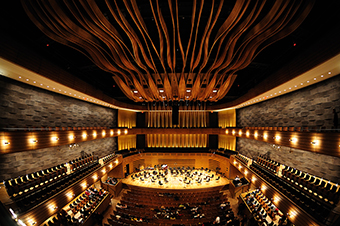
Koerner Hall © www.rcmusic.com
I accepted the job as Dean in 2007. At that time I was a tenured piano professor at a university near my home in Toronto (University of Western Ontario), and had never had an administrative job, so I was reluctant at first to accept the position. But I could see that the Royal Conservatory was going through an incredible transformation, which in part involved the construction of a stunning new facility with a concert hall that turned out to be one of the finest in the world for its size (Koerner Hall), so it appeared to me that RCM was on its way to becoming a great institution on the world stage – which has turned out to be true. I also already knew a lot about GGS, since I had a few students there from the time it was formed. So after much deliberation I decided to accept the offer to become the Dean. The first 5 years were the toughest – I had a vision of what the school should be, and I needed the people around me on our admin team to share that vision. So finding all of the right people to work with me, making certain key faculty appointments, and assisting with scholarship fundraising (which I still do) was a daunting task- but after about 5 years, at some point in about 2012, we really came into our own, and it has as a result been one of the most rewarding jobs I could ever ask for.
What exactly does the “job” entail? What are your responsibilities? Are there challenges, and will you share some of them with us?
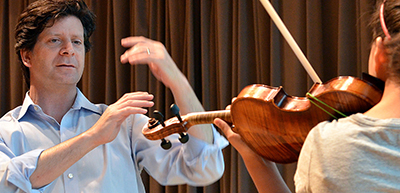
© www.rcmusic.com
Good question! Sometimes I get to the end of a very long day of meetings and emails (often late in the evening) and ask myself “what exactly did I do today?”, because there are so many different decisions that needed to be made, some bigger than others, yet all important. But in the end I am the Dean of the school, so the buck stops on my desk when it comes to everything. This means I am responsible for the smooth day to day functioning of two extremely demanding degree-granting performance programs (undergrad and post grad), and while I am doing that I am simultaneously planning for the following year. This involves the annual hiring of the four guest conductors who conduct our orchestra, putting together the four annual orchestral programs we perform in Koerner Hall (with input of course from our orchestral faculty and the conductors themselves), overseeing all of the yearly entrance auditions, overseeing a 10 person administrative team and a faculty of over 70 teachers, keeping a close eye on the financial stability of the school, supervising the hiring (and recruiting) of faculty, assisting RCM’s Development Department in securing new scholarship donors, often working closely with some of our most important donors, and working with our Marketing Department by keeping them up to date about the activities of our students and faculty. In addition I also teach a small studio (anywhere from 4 to 7 students), and am the Coordinator for the Piano Master Class series each year, which consists of at least 20 master classes – this means not only hiring the artists we bring in, but also being present at every class.
The most challenging thing about the job is the sheer volume of things I am responsible for. But I truly love the job, and am continually inspired by our students and faculty.
What attributes do you think you are endowed with, that make you suitable for the position?
I have spent my career teaching and performing. GGS is a small performance school, so I think the fact that I attended a performance school (Juilliard), have taught advanced performance students for over 40 years, and have performed over 1000 concerts around the world, all combine to give me the ideal background to understand what a small performance school really needs – both from the standpoint of the teachers and from the standpoint of the faculty. I understand the teachers because I am one, and I understand what it takes to be a performer, because I am one. In addition, I am a very organized person, and I am a very positive person who takes great satisfaction and joy in seeing and hearing people reach new levels of achievements. So I think I have been able to create a culture that encourages striving for great achievements with a positive spirit at every level of the school.
What aspirations do you have for the school going forward?
The most important thing is for us to keep improving in every area, which takes constant vigilance. In addition I want to see us continue to increase the scholarship funding for our students. When I got to GGS we had about 10 full tuition scholarships, and now over 60 because of an amazing Development Department and wonderful students who sell themselves to potential donors with their artistry.
Jim and his music career
When did you decide that you would dedicate your life to the pursuit of a music career? What other alternative career choices could you have made?
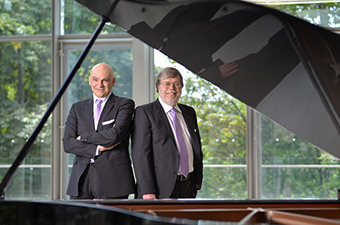
The Anagnoson & Kinton Duo © www.anagnosonandkinton.com
For someone who has gone on to a performance career, I actually got serious about the piano pretty late – at age 17 to be exact. I loved playing the piano from the minute I started as a child, but I didn’t like practicing by the time I was 12 or 13, so when I went to the Eastman School of Music at age 17 I actually went as a Music Education major, probably in retrospect not even knowing quite what that was. But in my first week at Eastman I found myself surrounded by many new friends playing all of this incredible music, and my life changed overnight – suddenly playing the piano became my passion –it was all I wanted to do. I started practicing 6 hours a day, simply because I loved it so much and couldn’t get enough of it, and in some ways that was the beginning of who I am today. I made up for lost time pretty quickly while at Eastman and went on to do my Master’s at Juilliard – an amazing experience since I found myself sitting in classes with the likes of Emanuel Ax. When I graduated I was still unhappy about my playing and knew I had to keep working extremely hard until I could do more of what I could hear. So I practiced 6 hours a day, played recitals for virtually no fee, and taught kids in order to pay the rent. I love kids, but I knew I didn’t want to teach them piano for my career, so I wasn’t sure what I would do when I felt my playing was where I needed it to be. At about the time I thought my playing was getting close, a Canadian friend I had met at the Aspen Music Festival – Leslie Kinton – asked if I wanted to do a two piano recital for the fun of it. It seemed like a good idea, so we chose a program, rehearsed for 9 or 10 weekends, and played a few duo recitals. But the minute we started rehearsing it was clear we had a special chemistry together, and many mentors who heard us (especially Gina Bachauer and Eugene List) really encouraged us – much to our surprise – to become a professional piano duo. So I reluctantly left New York and moved to Toronto and – well, the rest is history. We have now made over 10 CDs, and have played all over the world – and from the time we started touring I felt like I had won the lottery – they were actually paying me money to do what I loved!
If the performing career hadn’t materialized I think I would have been a teacher of some kind, but probably not in music – not sure, never got there……
Were there any anecdotal narratives that encouraged you to embark on this journey, leading to your present prominent role in the music community?
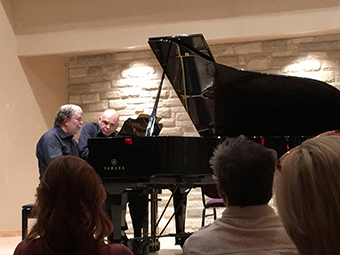
Anagnoson & Kinton performing © Guelph Musicfest
Well, like most successful careers I feel mine is the product of a lot of hard work, unwavering determination, and being in the right place at the right time. After the duo started we had played successful recitals in prestigious venues in London, New York and Boston – and although we had great reviews we quickly realized that to have a career as a piano duo you needed to own and be able to travel with your own pianos. At about that time we had a chance to perform on the stage of Massey Hall in Toronto in a concert sponsored by Yamaha Canada, and after the concert someone from Yamaha found us and told us that Yamaha would provide us with pianos anywhere we wanted to play in Canada and the USA. This was incredible, and completely unexpected. So the next thing I know we have two pianos on the road and became Have Pianos Will Travel, touring pretty extensively in the USA and Canada. This is such a great example of being in the right place at the right time, and fortunately we had worked hard and were prepared to perform well for 2000 people that night – but little did we know that a concert like that would have such a lasting impact on our career.
In your extensive experience as a performer and pedagogue, what individual personality traits (besides exceptional talent) do you think are vital to the attainment of a lucrative career in music?
First of all, I worry when I see the word “lucrative”. As a profession, music is and always has been a very difficult way to make a living. So if you are looking for a lucrative career you should look somewhere else. In fact, the only reason one should pursue a career in music – the ONLY reason – should be that music means so much to you that you just can’t live without it. I knew at age 17 that this was what I wanted to do in my life, and I knew that I would find a way to support myself, but that I was unlikely to make a lot of money – but I knew even at that age that the money didn’t matter – THIS was what I wanted to do in my life.
But if your question is what personality traits (aside from talent) are the keys to a successful career, then I have a number of answers, not unlike what it takes to be successful in any career:
1 is easy – you have to be able to work extremely hard.
2 is just about as easy – you have to be extremely determined, which means you have to be able to work against all odds to get what you want – that is real determination.
3 is you have to be able to accept failure, and indeed learn from it.
4 is you have to have to always be open to learning, eager to acquire knowledge, and you must be able to learn from many different places and in many different ways. And that must never stop – I still take great pleasure in learning things about playing, teaching and being an arts administrator every day.
Do you think that intense parental involvement in a gifted prodigy’s musical development is beneficial (or detrimental) to his or her artistic fulfillment and chances of succeeding in the industry?
It can be either – it depends on the parents, and it depends on the child. Actual prodigies are extremely rare – I have met only one in my entire career: Stewart Goodyear (who now, as you know, performs all 32 Beethoven Sonatas in a day, amongst his many achievements). But there are many gifted children, and in general they need parental guidance, since the discipline and the amount of practice needed is not really natural to children. But parental involvement too often means that parents are living their own childhood dreams through their children, or indulging in the satisfaction of having their children win prizes, both of which are usually a recipe for disaster. We all want to see our children do well, I understand that. We have one son, and from the time he was born we knew that our most important role with him would be to help him find what he loves, and to help him try to make a living at it – because in the long run that is what could bring him true happiness and a sense of fulfillment in his life. Fortunately he has always taken himself seriously, so we never really needed to supervise his studying. He did excel academically, but the important thing was that it came from him, so in that way he made our job as parents easy.
What is your expert opinion on the value of competitions in a music student’s education? What about later on at the advanced international level? Are there more ideal opportunities for launching a performance career?
Hmm – sounds like 3 questions to me!
OK, 1. Competitions are valuable as an incentive to practice, and as an opportunity to learn from the experience of playing in front of an audience, from getting different opinions from various adjudicators, and from hearing other competitors play well, since this can serve as an inspiration and be a motivation to work harder.
2. I have a lot of reservations about advanced international competitions. I do serve on the juries perhaps once a year or so, and it is stimulating for me to hear different players from around the world, and to meet new colleagues. But it is also upsetting to so often hear really unusual and interesting playing get eliminated from early rounds of a competition because the interpretations are perhaps unconventional. And it is disturbing to see juries so often get wowed by physical prowess that is often without any musical substance. I have too often seen juries award playing that I know will not be successful in the profession, because there is no real personal connection from the player, which ultimately is what audiences respond to.
3. If you win the 1st prize of one of the top 4 or 5 international competitions (Tchaikovsky, Leeds, Cliburn, Chopin) you can in a sense launch your career, since you will have about 3 seasons of many concerts around the world. But after winning you still need to build on what you have done and make your own career. Getting the first concert is made easier by competitions – but getting re-engaged is the sign of a successful career, and way too often playing that wins a big competition is not playing that people will come back to hear a 2nd time.
Jim and the future of classical music
In this day and age, when we have a dearth of young audiences (Millennials) in the concert halls all over the world, to support live performances of orchestras, operas, chamber musicians and recitalists, what can be done to attract a greater population of that demographic?
One of the biggest problems facing the music profession is the lack of organized music programs in schools. Children need to be in bands and orchestras as they are growing up to experience the sheer joy of making music as a group. Without that initial instrumental study, it often can take a lot longer for adults to turn to classical music. But I believe that classical music audiences will almost always be for the most part middle aged and older. Most classical music often doesn’t have instant appeal – it can take concentrated listening, and often repeated listening for one to get hooked. People in their 20s and even 30s don’t have a lot of spare time, and when they have time they often want something more easily attainable, so classical music often doesn’t have a lot of appeal for them. But then as people get into their 40s they start to look for something with deeper meaning, with more substance – and that is often where Bach and Beethoven come into the picture.
Why is there a disconnect between a general lack of enthusiasm at the audience level, and yet simultaneously, parental obsession with children studying musical instruments, often at an early age with reputable teachers?
Parents too often want their children to study music for the wrong reasons – to win prizes or gain attention. They then lose interest when it is time for their kids to “get serious” and go to university to study something to make a living. It is so disappointing that students spend so many hours as children playing instruments and then don’t attend concerts as adults – there is something wrong with that picture. The most important thing that parents need to realize is that playing an instrument for all of the work it takes needs to be fun, and it CAN be fun if taught and approached in that way, (and this is without even mentioning the positive studies on cognitive benefits to children who play an instrument). If kids have a good experience playing an instrument when they are young, they are more likely to grow into adults who want to come to hear live music. And by the way, I have never lost sight of how much fun it is to play the piano – yes, it is deeper than that – it can be profound and even a spiritual thing – but it is always fun as well!
Pedagogy has never been more engaging and effective in churning out professional-quality young musicians, as evidenced by the high caliber of participants in international music festivals and prestigious music competitions, creating an imbalance between supply and demand in the concert arena.
This has always been true – there have always been more good players than audiences to hear them. But at the same time it’s also important to realize that we have never had more well trained instrumentalists than we have today – but that real artistry is just as rare as it ever was.
As a “mover and shaker” in the music world, how do you view your importance in influencing the public’s interest in classical music?
One of the most impactful things we did during our career was to speak to audiences about the music we were playing, and often include musical demonstrations as we spoke. I quickly realized that people are open to listening to our music, but often don’t know the repertoire we are playing – yet with a few well chosen words and a short musical example you can open the door into the piece for them. So I think being able to speak in an engaging way about one’s music is really important. I also think that young artists need to realize that the most important thing they need to do when they perform is to play from their hearts, and with a personal voice – in other words to be truly communicative. Teachers need to realize this as well as they guide their students. Too often we hear highly trained and polished pianists who have in fact lost their personal voice – they are so “well taught” and playing so “correctly” that there is no significant personal connection anymore in their playing. Audiences will quickly know that, even without knowing what they are missing, and the event will have no magic.
How can we instill the love of music to young people these days, with so much technological distractions and cultural deficiencies in their lives? How can we integrate the discrepancies in society?
I still think there is nothing like playing an instrument as a kid to awaken a love of music in us. And even better if one can play in a group setting at a school – I actually played the drums at school even though I was studying piano seriously at New England Conservatory as a kid – and I LOVED playing drums in the school band and orchestra – something we don’t see much of these days. I also think going to concerts as a kid is really important – even if just for half of a concert – to experience live music being performed at a really high level can be memorable, even if it may not seem it at the time!
What future role do you think classical music (as we know it) will occupy in this ultra dynamic, progressive and fast-changing world?
The one thing I know is that the music we play is the work of geniuses – and it is not going away. So how it gets delivered, and how it finds its place alongside all of the other distractions of the world today and tomorrow is anybody’s guess – but I know it will be there!





Dear Jim,
An amazing career and interview. Congratulations!
I am in full agreement with your outlook on Classical music. There is nothing like it in the world.
You were the fetching, little ring bearer in our August 27, 1950 wedding.
Your beloved Dad, John, was our best man, with your brilliant, charismatic
Mom, Angeline, by his side, gracing our event. Lovely, unforgettable people.
We were fortunate to have played a small role in your lives.
I send you my heartfelt best wishes for a Happy New Year.
Always,
Hope (and George) Cares
Dear Hope – I just discovered your lovely note – thank you so much! Would love to see you if you are ever in the Toronto area – thanks for sharing this story with me – very best, Jim